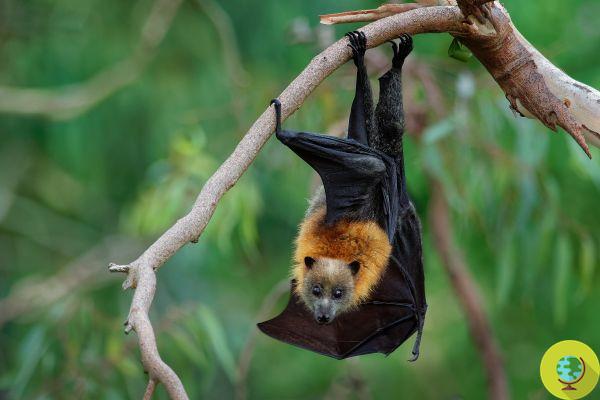
A real phobia towards bats is growing after the outbreak of the pandemic, but these animals are fundamental for the Planet
He is about to end up run over, his mother saves himThey've faced drought, extreme heat, and bushfires, and now they're dealing with a new paranoia courtesy of the pandemic ...
Bats, like every year, are in increasing numbers in the suburbs of Australian cities, but while they are looking for food, this time, after the outbreak of the coronavirus pandemic, they are creating new paranoia among the inhabitants and a kind of repulsion in their comparisons, so much so that there are already those who speak of infestation and would like to see them disappear.
However, this would be a serious danger for the survival of the Planet, because these bats play a very important role in the pollination of numerous plants, including about 450 species of plants used by man for commercial purposes: fruits such as banana, peach, guava, mango, avocado, fig, date, papaya, almond, cashew, vanilla and carob, as well as other products such as tequila (from the agave plant). They therefore help to maintain biodiversity and forest regeneration, as well as being part of the food chain.
But sadly, after the coronavirus pandemic broke out, bats became taboo animals. In Australia we find the gray-headed flying fox (Pteropus poliocephalus) and the red flying fox (Pteropus scapulatus).
In Ingham, in the far north of Queensland, an influx of over 200 bats has been singled out as an infestation. Residents complain that they eat the fruits of their gardens, that they are noisy and smell bad, as well as fear that they could transmit diseases. The point is that as the concrete grows, their habitat disappears, so affected by drought and logging and fires, bats are increasingly pushing into inhabited villages in search of food. These bats can fly hundreds of kilometers
“We have flying foxes that are becoming more and more urban because they are losing habitat. There is now also a great diversity of trees in our cities. There have been conflicts with farmers for decades, ”Pia Lentini, an expert on bats, explains to The Guardian.
In fact, they arrive in the city, however, because they are dying of hunger and according to Lentini, it is useless to move them. In Australia's National List of Threatened Species, gray-headed flying foxes are considered vulnerable, and the spectacled flying fox (Pteropus conspicillatus Gould) was listed in 2019 as Vulnerable to Endangered.
Lentini is leading a research project to understand the concerns of people living near nine flying fox fields in Victoria, New South Wales and Queensland. "There is a lot of anger and frustration, but there is no real quick fix to help people live near flying foxes, compromises have to be found, such as double glazing and shade cloth," says the expert. Precisely because while bats may be a temporary nuisance to some (large streams typically dissipate once food is finished), the species itself is struggling for survival.
"Extreme heat, drought, forest fires and all kinds of suffering have caused the deaths of 70 spectacled foxes," explains ecologist David Westcott who has been studying the species for 20 years.
Australian bats - like all bats - can carry a wide range of viruses. The Sars-Covid-2 virus that led to the pandemic probably originated in bats, and the most likely scenario is a "zoonotic" transfer to another animal, and then to humans.
"We shouldn't pretend that flying foxes are not vectors of some diseases, but this only happens if you have intimate and close contact with the animal and in general it doesn't," says Westcott.
A spokesperson for the federal environment minister, Sussan Ley, said that bats “play an important role in our ecosystem, pollinating trees and dispersing seeds over large areas. While the department will continue to closely monitor the situation on zoonotic diseases in bats, there is no evidence of SARS-CoV2 (the virus that causes Covid-19) in any Australian bat species. "
Sources: The Guardian / Flying Animals
Read also:
- You can save Mexican bats by buying certified bat-friendly tequila
- Bat-Box: in the province of Taranto installed the houses for bats against mosquitoes
- Ikea transforms old furniture into houses for birds, bees and bats


























